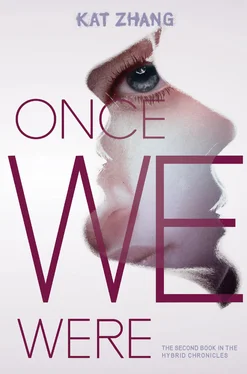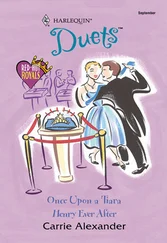I said.
Addie was right. It had always been Addie who yearned for normality. She’d had the luxury of thinking about it. Growing up, there had been no version of normality that could coexist with my survival.
Now there was. And I wanted it, more than anything.
Still, it was Addie’s choice as much as mine, and I could feel how torn she was. But I could also feel the ghost of Ryan’s lips against our jaw, and the phantom twist in our gut every time he got too close—the pain that wasn’t mine.
I couldn’t stay like this forever.
Maybe it was Emalia who convinced Peter to let us attend the meeting. But something in me felt it was Sabine who pulled through for us in the end. Jenson’s speech had set everyone on edge, even Emalia. Ryan shot us an exasperated look behind Emalia’s back as she fluttered around, giving us instructions: don’t talk, keep walking, attract as little attention as possible.
By the time we left the building, it was dark out, the streets lit only by sallow streetlamps and the occasional headlights. From what Jackson had told us, this was the part of the city tourists didn’t visit. No one lived here but the people who had to, the ones who couldn’t afford better housing. Or, I supposed, the ones like us, in hiding.
Usually, only a select few were called to Peter’s meetings, or chose to attend. But tonight, there must have been at least thirty people. It was overwhelming to look around, see these faces, and know that almost all of them were hybrid, like us. Living in secret, like us. Carrying on relatively normal lives in a country that wanted them dead.
They looked like anyone else. There was a middle-aged man who might have been a banker. A young woman in sweats like she’d come here straight from the gym. An older lady who reminded me a little of our fifth-grade teacher. I caught Hally’s eyes flickering from person to person, too, drinking in this crowd. Even Kitty had been allowed to come—if only so she wouldn’t be left alone. But not everyone was here. Two, at least, were missing: Dr. Lyanne and Jaime.
Addie said. They stood in the dining room along with two others: a strawberry-blond boy about Jackson’s age with a constellation of freckles, and a girl with platinum-blond hair but dark eyebrows. Sabine caught our eyes and smiled. Addie smiled back. Other than Kitty, we were the youngest in the room.
Peter stood, and conversations dwindled. Physically, he was intimidating—tall, broad-shouldered, and sturdy, but with a face that could be kind. It was at his most austere, though, that I best saw his resemblance to his sister, Dr. Lyanne. They had the same strong brows, the same sharp eyes.
He resembled her now, as he said, “I’m sure by now you’ve all heard about Mark Jenson’s address this morning.” He took a long, slow breath. “But not all of you have heard about the Hahns institution, and that’s where I’ll start.”
The room sat silent as Peter explained. He’d been keeping tabs on an institution in the mountains of Hahns County, up in the north, since before the Nornand breakout. The conditions were frigid during the winter, the building old, the children ill dressed and uncared for. In other words, they died like flies when the snow came in.
Plans for rescue developed slowly. The mountain terrain complicated things, so it was decided that any attempt would have to be conducted in summer, when conditions were fairest. A woman, Diane, had been seeded as a caretaker—institutions weren’t staffed by nurses and doctors, like Nornand, but caretakers—and Peter had flown up to meet with her.
Everything fell apart when Diane’s cover was blown. Desperate, she stole away six children in her car as she made her escape.
She didn’t make it far.
She and two children died when their car went over the side of the winding mountain road. The remaining four kids extracted themselves from the wreckage and fled before the officials arrived.
Ten hours later, they stumbled into a small town still wearing their institution uniforms, filthy and bleeding and exhausted. The eldest of them was twelve, the youngest ten—just past the government-mandated deadline.
The police were called, the children whisked away. But not before their story of terror and pain spread, twisted in eager, gossiping mouths.
Peter laughed low, humorlessly. “It was an ugly thing for the townspeople, I’m sure, on a Sunday morning.”
Easy to not think about other people’s suffering, when it was hidden away. Harder to stomach when it collapsed on your front porch.
At Nornand, we’d all worn blue.
What color did they wear at Hahns?
“But it’ll never get beyond that.” Sabine’s voice was quiet, but clear. “The media will never be allowed to pick up the story.”
Peter shook his head. “It was unlikely to begin with. It’s impossible now, with the announcement Jenson made this morning. Which was probably the point.”
Addie frowned, but I understood. By saying they were making headway in a hybrid cure, they could quash the Hahns story. And by saying something about possible hybrid retaliation, they now had an excuse to dial up security without having to admit to the recent breakouts.
“Diane was a cautious woman,” Peter said. “But someone found out enough to be suspicious. We don’t know if they’ll connect the dots between this incident and the Nornand breakout—or if they have anything that might tie her back to us. So everybody, be alert. Be cautious. We’ll have to lie low for a while.”
“What about that new institution at Powatt?” It was Sabine again. She fingered one of the golden buttons on her jacket as she spoke, running her thumb along the smooth edge.
Peter turned toward her. “What about it?”
“Powatt’s barely an hour and a half from here. We’re not concerned they’re starting to build institutions within easy driving distance of major cities?”
“Say what you mean to say, Sabine,” Peter said.
Sabine began to reply, but the redheaded boy cut her off. “She means: Don’t you think it’s a problem that it’s okay now to stick institutions near a bunch of people? Everyone knows about them, but once upon a time, they still had enough of a conscience to not want a hundred dying children in their backyard. Now nobody cares?”
His voice was familiar—rough and heated and laced with anger. It had to be Christoph, the boy who’d called this morning.
“The country’s getting more and more apathetic, Peter,” Christoph said. “And the government’s getting bolder. Soon, they’re not even going to worry about covering up stuff like the Hahns institution. They’ll be able to round up hybrid kids in the street and put bullets in their heads—”
“Christoph,” Peter said just as Jackson nudged the other boy’s shoulder with his own. Christoph quieted, but didn’t control the mutinous look on his face. “We’re gathering more information about the Powatt institution. Once we know what we need to know, we’ll address it as it needs to be addressed.”
I had a sudden, gut-wrenching thought.
How long had Peter “gathered information” before he decided to launch a rescue plan? The first time we’d spoken with Jackson, when he’d pulled us into that storage closet at Nornand, he’d told us to keep hope because a rescue was coming, but it needed more time. We’d told him we didn’t have more time, that Hally and Lissa were due for the operation table.
If Jackson hadn’t spoken to us that day, the rescue might have happened days or even weeks later. Hally and Lissa might be dead.
Читать дальше
Конец ознакомительного отрывка
Купить книгу












